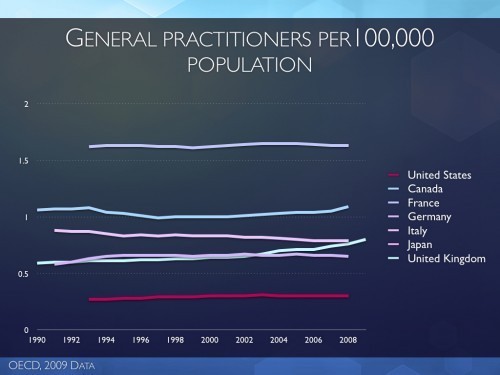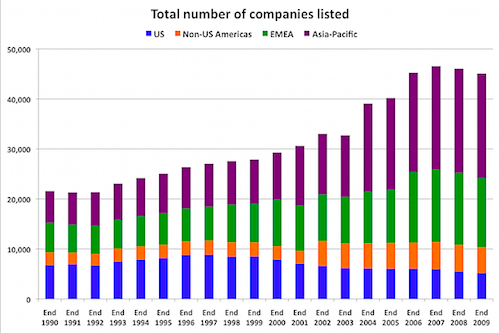Matthew Yglesias's Blog, page 2407
February 27, 2011
Foreign Cows vs Foreign People
Charles Kenny contrasts America's stringy treatment of foreign-born people who'd like to move to the United States with our generous treatment of foreign-born cows:
Once in the United States, Canadian and Mexican cattle have to be treated just like native-born cows — they can't be labeled differently to consumers or otherwise discriminated against. Canadian and Mexican people have no such luck. For example, Canadian Kiefer Sutherland, star of the hit TV show 24, couldn't apply for the government job he pretends to have on TV, despite his character's role as a forceful practitioner of truth, justice, and the American way.
One element of this bovine bias is that cows get immediate access to the U.S. welfare system. In 2009, 9 million dairy cows living in the United States received $1.35 billion in subsidies, regardless of their country of origin. That's about $20,000 a year per bovine household (or herd, which averages around 133 cows). Meanwhile, annual payments for the average human household on welfare are only around $16,800 — and, of course, around four-fifths of legal immigrants aren't on any type of welfare at all, while illegal and nonpermanent human residents aren't even eligible. If you want to see a real welfare queen, check out a dairy cow.
By the standards of the rich world the United States is an outlier in terms of having better policies toward both immigration and farm subsidies than does Europe or (especially) Japan, but there's still tons of room for improvement here.


No Good News From North Korea
No catch-up growth in the DPRK and no signs of change either:
Recent refugees, scholars of North Korea and South Korean government officials see no signs that the economic hardships are pointing toward political instability. They see no existential threat to Kim Jong-il and his government, whether through civil unrest, political factionalism or a military revolt.
Humanitarian and ethical issues aside, you'd think a person would prefer to be the dictator of a China-style country with rapid economic growth than a North Korea-style one with mass impoverishment. Apparently PRC officials have tried to make this point in Pyongyang, but nothing much is happening.


Population Trends
Consider this puzzle. Compare economic performance in two periods: 1973-1990 versus 1990-2007. Both periods are 17 years in length; both begin and end with the last year of an economic expansion. In the earlier period, the U.S. economy weathered oil shocks, stagflation, and a punishing recession in the early '80s, and growth in labor productivity in the nonfarm business sector limped along at a dismal 1.33 percent a year. In the latter period, prosperity was interrupted only by a pair of brief, mild recessions, and the IT revolution led a dazzling rebound in productivity growth up to 2.33 percent a year. Yet in 1973-1990, real gross domestic product per capita rose at an average annual rate of 1.93 percent – better than the 1.85 percent average annual growth rate during 1990-2007. How could that have happened?
The answer to the mystery lies in the gradual, ongoing slowdown in employment growth. Between 1973 and 1990, total civilian employment rose 39.6 percent, as compared to only 22.9 percent between 1990 and 2007. After decades of steady increases, female participation in the labor force plateaued during the 1990s; meanwhile, the aging of the population has been slowing down the growth of the overall labor force. Think of per-capita GDP growth as a function of two variables: output per worker-hour (labor productivity) and the total number of worker hours. As it happened, the big productivity surge that started in the mid-1990s wasn't enough to offset the big drop-off in employment growth.
"We should let more people, especially people with skills, immigrate to America and work for a living" isn't a very profound answer to the mysteries of economic growth, but it sure would do a lot of good.


February 26, 2011
AFT's Randy Weingarten Proposes Overhaul of Teacher Dismissal Procedure
Good news: "Responding to criticism that tenure gives even poor teachers a job for life, Randi Weingarten, the president of the American Federation of Teachers, announced a plan Thursday to overhaul how teachers are evaluated and dismissed. It would give tenured teachers who are rated unsatisfactory by their principals a maximum of one school year to improve. If they did not, they could be fired within 100 days."
Obviously there's plenty of room around the margin for people to disagree about the best way to conduct these kind of evaluations. But as I've been saying, it's only within the context of believing that teacher quality is important and measurable that it's possible to coherently make the case for the importance of teachers and investing in them. Weingarten has the right instincts on this.


Should Derrick Rose Shoot Less?

David Berri says yes:
Rose currently has an effective field goal percentage of 0.488. Kyle Korver, Carlos Boozer, Kurt Thomas, Keith Bogans, Joakim Noah, and Luol Deng are all more efficient from the field than Rose. So if Rose let just let one of these teammates take three of his shots each half, it seems unlikely the Bulls would be worse off.
After all, many of these players have taken more shots per game (at similar levels of shooting efficiency) for other teams in the past. So it seems likely that Rose passing the ball a bit more often wouldn't cause the number of games won by the Bulls to decline.
This ultimately strikes me as a more persuasive use of shooting efficiency stats than do efforts to collapse everything into an overall player evaluation stat. It's natural for the offense to run through Rose rather than a guy like Korver or Noah, but the fact that both of them have higher TS% numbers than Rose and have taken more shots per game in the past suggests that at the margin he needs to pass a bit more and shoot a bit less.


Unsolicited Advice for Arab Monarchs

Watching events play out in Libya, it seems to me that the best advice the US government could offer to friendly regime leaders in Jordan, Saudi Arabia, Kuwait, the UAE, etc. is to get on the phone with King Juan Carlos I of Spain. The impression I get is that it's pretty good to be the king, even if you reign rather than rule. And constitutional monarchy is a fairly widespread and successful form of government found in the British Commonwealth, Spain, Sweden, Norway, Denmark, Belgium, the Netherlands, and Japan. But of all those people it's only King Juan Carlos who actually personally oversaw a transition to constitutional government.
Whether or not oil-rich monarchies have what it takes to withstand the current wave of political change, surely it must be obvious that these ruling families can't continue to exercise dictatorial power forever. Far and away the most plausible way for them to stay in positions of privilege and influence is to get ahead of the curve and lead change to a scenario in which elections, rather than royal favor, determines policy outcomes.


Jeff Green is a Bad Basketball Player
I've been marveling at the Boston Celtics' willingness to give away Kendrick Perkins for a couple of days now on twitter, and what Boston fans who like this deal seem to be missing is that Jeff Green is a bad basketball player. You might think a starter on a good team like Oklahoma City could be the extra athletic wing player Boston needs, but it doesn't stand up to scrutiny once you realize that . . . Jeff Green is a bad basketball player. His three point shooting (.304) is bad, and he's a poor rebounder. His field goal percentage (.437) is also bad. He's bad. He's a young guy, and was a starter on a quality young team, so he gives the superficial appearance of being one of the good young players of the Oklahoma City Thunder. But he's not. He's a bad player, and it's just a coincidence that he had some good teammates.


America's GP Deficit
American doctors are generally paid much more than doctors in other rich countries, but we nonetheless have strikingly few general practitioners:

And yet it's GPs who are best-positioned to do the kind of advice-giving and preventive health work that's far and away the most cost-effective way to improve health outcomes.


The Decline of American Stock

US listings now account for only about 10% of all listed companies globally — that's significantly less than America's share of global GDP, which is closer to 20%. Even as the US is moving from public to private, or at the very least from many public companies to fewer public companies, the rest of the world is still moving fast in the opposite direction.
I think there's something deeply weird about the idea of the publicly traded firm, and the more we get funds and algorithm-based trading in financial markets the weirder it becomes.


February 25, 2011
Endgame
Smash up your seats:
— P.J. Harvey's black painting.
— Newt Gingrich wants a federal government shutdown.
— Peter Orszag's swagger.
— McDonalds' hamburgers .
The Clash, "Revolution Rock"


Matthew Yglesias's Blog
- Matthew Yglesias's profile
- 72 followers



